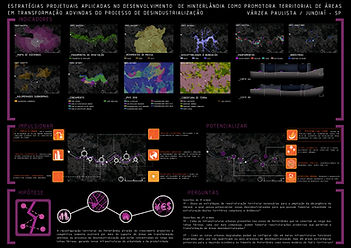[ PORT TERRITORIES ]

Hinterland as a promoter of territorial development strategies for degraded urban areas in port cities in Latin America.
Presentation:
The proposed research project is complementary to the project developed at the Synthesis Center, Institute for Advanced Studies – IEA USP, entitled "The Hinterland as a Territorial Promoter of Areas Undergoing Transformation Due to the Deindustrialization Process," conducted during 2019 and 2020. This project focuses on identifying in Latin America the territorial impacts resulting from the failure of infrastructures, leading to various degraded zones across the region.
The research presents an opportunity for port areas and their connections with urban and productive sectors, promoted through strategies that drive the "Sustainable Development Goals." This aims to foster interconnection networks with cities and their infrastructures, establishing improvements in degraded urban zones through the structuring and development of "Super Hinterlands."
The choice of this theme is based on the significance of port zones and their connectivity with productive sectors, and how they interconnect with cities and their infrastructures. Throughout the 20th century, mainly the industrial sectors experienced economic decline, generating various territorial problems.
The model allows for the expansion of potential zones of density, employability, and the enhancement of urban development indicators, due to this characteristic being geographically significant in Latin America. The focus is established on connectivity and the macro hub (concentration zone) of possible interconnection, present in the main ports identified in 2020 by ECLAC (Economic Commission for Latin America and the Caribbean).
The research aims to apply strategies that enable the development of future project scenarios for hinterland zones in Latin America. It seeks to promote and foster articulated networks among new cities, more competitive port edges, and support in the macro territory through the application of methodological tools based on the restructuring of new economic cycles and more competitive urban territories. This approach intends to expand the capacity of industrial sectors, productive capacities, and urban distribution capabilities derived from these sectors to generate new characteristics of Port Hubs in response to territorial improvements.

WORKSHOP ON DESIGN STRATEGIES OF DEGRADED PORT ZONES IN GUANABARA BAY
The workshop will take place between the 7th and 13th of January at the Veiga Filho University in Rio de Janeiro as part of the Extension "Strategies for territorial and socio-economic development of degraded urban areas in the hinterland of the Port of Rio de Janeiro – RJ / Brazil"
Access the schedule

WORKSHOP ESTRATÉGIAS DE [RE]ESTRUTURIZACIÓN, DESARROLLO ECONÓMICO Y TERRITORIAL DE ÁREAS URBANAS DEGRADADAS EN REPÚBLICA DOMINICANA
The workshop took place in person from October 22-29 with students from the Universidad Autonoma de Santo Domingo, in Santo Domingo, Dominican Republic, and was supported remotely by student researchers from LabStrategy. Strategy boards were developed for the investigated territory: Puerto de Haina. The work is part of the Latin American Forum of Cities 2021, which occurred between October 27-30.
Check here for more.
EXTENSION - SAN ANDRES
Development strategies for coastal cities in the face of climate change: the case of San Andrés Island, Colombia.
Check it out here.
EXTENSION - SAN ANDRES
Territorial remodeling design strategies: the archipelago and the coastal edge of the city of Castro in Chile.
Check it out here.
EXTENSION - RIO DE JANEIRO
Territorial and socio-economic development strategies for degraded urban areas in the hinterland of the Port of Rio de Janeiro - RJ / Brazil
Check it out here.

































%20MACKENZIE%20_%2015_10_2020_A%20HINTERL%C3%82NDIA%20COMO%20PROMOTORA%20DE%20ESTRAT%C3%89GIAS%20DE%20DESENVOLVIM.jpg)




























.jpg)









%2016_26_45_a22e508d.jpg)

